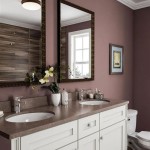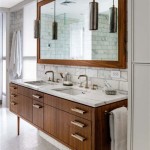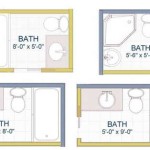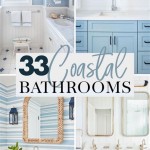Best Shower Doors For Small Bathrooms: Maximizing Space and Style
Small bathrooms present unique design challenges, particularly when it comes to shower enclosures. Choosing the right shower door can significantly impact the perceived size and functionality of the space. An ill-fitting or bulky door can exacerbate the feeling of confinement, while a well-selected option can create an open, airy atmosphere. This article explores several shower door styles that are ideally suited for small bathrooms, highlighting their key features and benefits for maximizing space and enhancing the overall aesthetic.
The selection process should prioritize space-saving designs, ease of access, and the visual impact on the room. Considerations such as door swing direction, frame style, and glass type are crucial for achieving the desired outcome. Understanding the nuances of each option is essential for making an informed decision that optimizes both functionality and style within the limited confines of a small bathroom.
Sliding Shower Doors: A Classic Space-Saving Solution
Sliding shower doors, also known as bypass shower doors, are a popular choice for small bathrooms due to their ability to eliminate the need for swing space. This design feature is particularly beneficial in bathrooms where the shower is located near a toilet or vanity. Instead of swinging outward into the room, the doors slide horizontally along tracks, allowing for unobstructed movement and maximizing usable floor space.
The typical sliding shower door consists of two or more panels of glass that overlap as they slide. This mechanism creates a watertight seal when the doors are closed, preventing water from escaping the shower enclosure. While most sliding doors offer a smooth and quiet gliding action, the quality of the rollers and tracks can significantly impact performance. It's essential to opt for high-quality hardware to ensure long-term durability and ease of use.
One potential drawback of sliding shower doors is the reduced opening size. Because the doors overlap, the access point is typically narrower than that of a swing door. This can be a concern for individuals with mobility issues or those who require assistance while showering. However, some models offer wider openings or the option to slide both doors to one side, providing greater accessibility.
Material options for sliding shower doors range from framed to frameless designs. Framed doors typically feature metal framing around the glass panels, providing added structural support and aesthetic appeal. Frameless doors, on the other hand, offer a more minimalist and contemporary look. They utilize thicker glass and minimal hardware to create a seamless and open feel. While frameless doors can be more expensive, they can significantly enhance the visual appeal of a small bathroom by creating a sense of spaciousness.
Maintenance is another key consideration. Sliding shower doors can accumulate soap scum and water stains in the tracks and around the frame. Regular cleaning with a mild detergent and a soft brush is necessary to prevent buildup and maintain a clean appearance. Some models feature easy-to-clean tracks or removable rollers, simplifying the maintenance process.
Pivot Shower Doors: Combining Functionality and Style
Pivot shower doors offer a versatile alternative to sliding doors, providing a more traditional swinging motion while still being suitable for smaller bathrooms. Unlike hinged doors that swing open from the side, pivot doors rotate on a vertical axis, often located near the center of the door. This unique design allows for a wider range of opening angles and can be particularly useful in bathrooms with limited space.
The key advantage of pivot doors is their flexibility. They can swing inward or outward, depending on the bathroom layout and user preference. In small bathrooms, it's often preferable to have the door swing inward to avoid obstructing walkways or impacting other fixtures. However, the ability to swing outward can be beneficial in emergencies or when assisting someone in the shower.
Pivot doors typically require less clearance than hinged doors, making them a viable option for bathrooms where space is at a premium. The pivot mechanism distributes the door's weight evenly, reducing stress on the frame and hinges. This contributes to the door's overall stability and longevity. The weight distribution also allows for larger and heavier glass panels to be used, creating a more luxurious and upscale feel.
The aesthetic options for pivot shower doors are diverse. They can be customized with a variety of frame finishes, glass types, and hardware styles to complement any bathroom decor. Frameless pivot doors are particularly popular, as they offer a clean and modern look while maximizing the amount of natural light that enters the shower enclosure. The minimalist design also contributes to a sense of spaciousness.
Installation of pivot shower doors requires careful attention to detail. The pivot points must be precisely aligned to ensure smooth and effortless operation. It's often recommended to hire a professional installer to ensure proper installation and avoid potential issues such as leaks or misalignment. This is especially crucial for frameless models, where precise measurements and secure mounting are essential for stability and safety.
Water leakage can be a concern with pivot shower doors, particularly if the sealing is not properly installed. Choosing a model with high-quality seals and sweeps is crucial for preventing water from escaping the shower enclosure. Regular inspection and maintenance of the seals are also necessary to ensure long-term performance and prevent water damage.
Folding Shower Doors: Maximizing Access and Minimizing Intrusion
Folding shower doors, also known as bi-fold shower doors, present a unique solution for small bathrooms by combining the space-saving benefits of sliding doors with the wider access of pivot doors. These doors consist of two or more panels that fold inward or outward, creating a compact profile when open and a secure enclosure when closed. This design is particularly well-suited for bathrooms where maximizing both space and accessibility are critical.
The primary advantage of folding shower doors is their ability to minimize intrusion into the bathroom space. When folded, the door panels occupy a minimal footprint, leaving ample room for movement and other fixtures. This is especially important in small bathrooms where every inch of space counts. The folding mechanism also allows for a wider opening than sliding doors, providing easier access for individuals with mobility limitations.
Folding shower doors are available in a variety of styles and configurations. Some models feature two panels that fold inward, while others have multiple panels that fold outward. The choice depends on the bathroom layout and the desired aesthetic. In general, inward-folding doors are preferred in small bathrooms to avoid obstructing walkways or impacting other fixtures.
Material options for folding shower doors range from framed to frameless designs. Framed doors typically offer greater structural support and are often more affordable. Frameless doors, on the other hand, provide a more modern and minimalist look. They utilize thicker glass and minimal hardware to create a seamless and open feel. The choice depends on personal preference and the overall design of the bathroom.
The quality of the hinges and folding mechanism is crucial for the long-term performance of folding shower doors. It's essential to opt for high-quality hardware that is designed to withstand repeated folding and unfolding. Regular lubrication of the hinges is also recommended to ensure smooth and quiet operation. Neglecting maintenance can lead to premature wear and tear, potentially requiring replacement of the door.
Water leakage can be a concern with folding shower doors, particularly at the joints between the panels. Choosing a model with effective seals and sweeps is crucial for preventing water from escaping the shower enclosure. Regular inspection and maintenance of the seals are also necessary to ensure long-term performance and prevent water damage. Some models feature magnetic seals that provide a tighter and more secure closure.
Installation of folding shower doors can be more complex than with other types of shower doors. Precise measurements and careful alignment are essential for ensuring proper operation. It's often recommended to hire a professional installer to avoid potential issues such as leaks or misalignment. This is especially crucial for frameless models, where precise mounting is critical for stability and safety.
In conclusion, selecting the right shower door for a small bathroom requires careful consideration of space constraints, accessibility needs, and aesthetic preferences. Sliding, pivot, and folding shower doors each offer unique advantages and disadvantages. The optimal choice depends on the specific layout of the bathroom and the individual needs of the user. By carefully evaluating the available options and prioritizing quality and functionality, it's possible to create a shower enclosure that maximizes space, enhances style, and provides a comfortable and enjoyable showering experience.

What Makes The Ideal Shower Doors For Small Bathrooms

The Best Shower Enclosures For Maximising Space In Small Bathrooms

Best Shower Enclosure Ideas To Achieve Your Dream Bathroom

Best Shower Enclosure For Small Bathroom

Best Shower Enclosure For Small Bathroom
Small Bathroom Ideas With Shower To Transform Your Space

What Are The Best Shower Doors And Enclosures Community Glass Mirrors

16 Walk In Shower Ideas For Small Bathrooms To Make Them Look Bigger 34 St John Ltd

What Are The Best Glass Shower Doors For Small Bathrooms Golden

The Top 9 Frameless Shower Door Ideas For 2024







